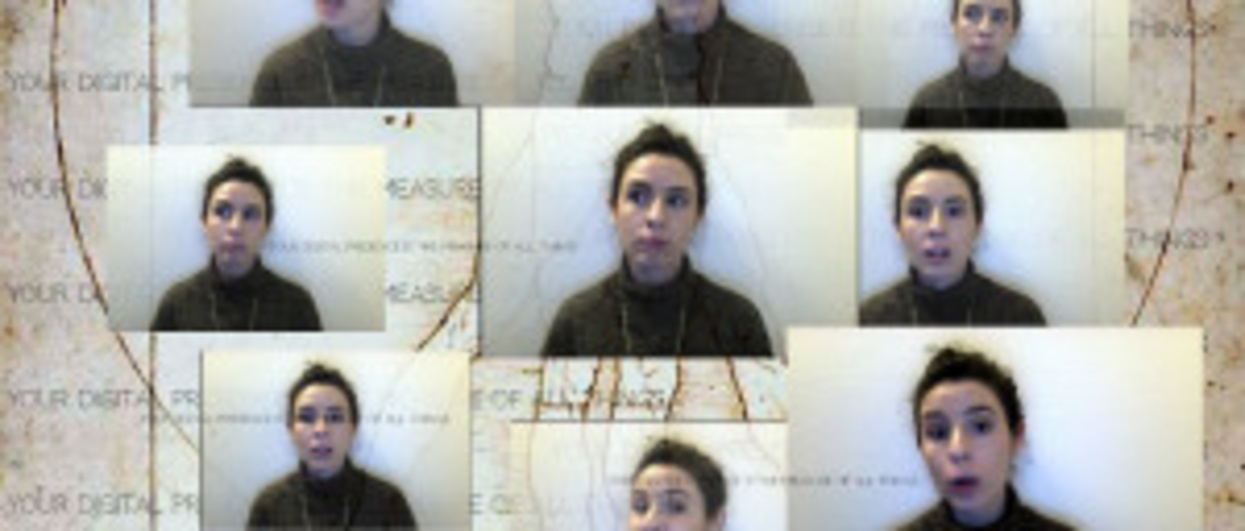Meet Alex Saum-Pascual

Heavy wood furniture is out and electrical outlets are in at the Doe Library exhibition space, which will receive a makeover this Fall! Spearheading the retrofitting of a historic 1911 building is no easy task, but Alex Saum-Pascual, an assistant professor in Spanish and Portuguese and executive committee member of the Berkeley Center for New Media, was up for the challenge as she sought to bring to campus No Legacy || Literatura Electrónica. From March to August 2016, the library will host a new media installation of electronic literature, curated by Alex in collaboration with partners from Mexico, Spain, and Kansas.
Raised in an Anglo-Spanish household in Madrid, Alex has always been fascinated by language. Her multilingual environment inspired her to pursue BA in Interpreting and Translation at the University of Granada, where she focused on English, French, Spanish, Arabic, and Slovak. She later obtained a diploma in Modern Languages at the University of Northumbria at Newcastle.
In the process of studying so many languages, Alex discovered her passion for her mother tongue: Spanish. And when she received her Masters in Foreign Languages and Pedagogy at the University of Delaware, she finally realized how much she loved teaching Spanish as well. So Alex enrolled in a Ph.D. program at the University of California at Riverside, where she intended to study peninsular literature with an eye towards the Spanish Civil War. But while at UC Riverside, Alex read Agustín Fernández Mallo’s Nocilla Dream (2006) and her research shifted entirely.
Mallo and the “Nocilla” generation of writers use nonlinear plots, fragmented storytelling, collages of narrative and nonfiction passages, and hybrid or multimedia publications including blogs and other electronic mediums. The Nocilla generation captures the Spanish questioning of mainstream culture and societal conventions in a time of economic crisis and unprecedented media, pop culture, and tech saturation in daily life. Alex was hooked on electronic literature.
Electronic literature, which incorporates the unique visual, audio, and temporal capabilities of computers and other electronic interfaces into its story-craft, is an understudied and ephemeral part of contemporary literature. The medium has evolved with technological change: early floppy disks have given way to CDs and now web-hosted repositories. The medium pushes literature both in presentation and formation, with works incorporating embedded information and multimedia, and cross-platform material, involving collaboration between writers and techies, and interaction with an online community.
Alex seeks to highlight the importance of this field both through her academic research and public programming. She is completing a book on the subject, entitled Trace of the Digital: Post-Web Literature in Spain, which studies the influence of electronic writing technologies on both printed and digital works. Analyzing works that actively exploit the software tools and online capabilities of electronic literature, she argues that the form and content of these pieces reject the contemporary canon and push conventions.
The No Legacy exhibition will further raise awareness of the significance of electronic literature. No Legacy celebrates electronic literature in Spanish, Portuguese, and English, providing a counterpoint to the pervasive Anglophone focus on electronic literary research. While acknowledging the Anglophone contribution to the medium and emerging electronic genres, the installation explores the Hispanic and Lusophone print contributions to electronic literature through the experimental writing of Luis Borges and Julio Cortázar, magical realism, Brazilian concretism, and Spanish American futurism, ultraism, and creationism.
The exhibition is being presented in coordination with the University of Kansas’ Élika Ortega, the Doe Library, and the Berkeley Center for New Media, which Alex credits with providing a forum to showcase her research and interact with other pursuers of interdisciplinary and multimedia humanities research beyond Spanish literature. Worthwhile, since Alex’s academic goals are far-reaching.
The fleeting nature of web material and the rapid pace of technological change mean that electronic literature can be hard to access and interpret. Many of the earliest works are only preserved on floppy disks and other outdated mediums, while much recent web material is web hosted and easily lost. Alex and other academics are pressing for the creation of more permanent and accessible archiving, particularly for Spanish language material, which is often overlooked in existing databases and archives.
Help the Berkeley Center for New Media preserve electronic literature and increase the diversity of archived materials by donating today!
